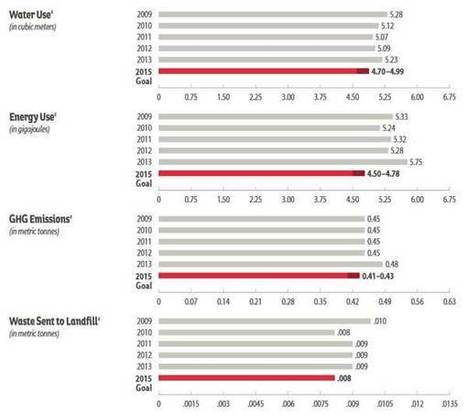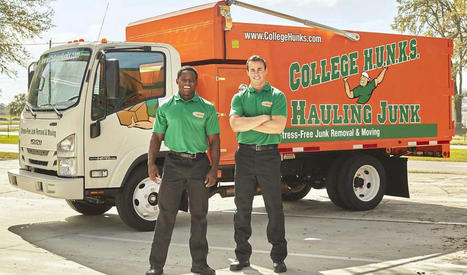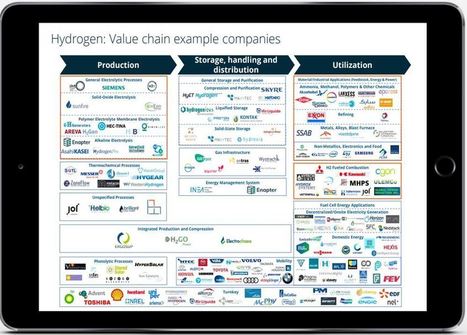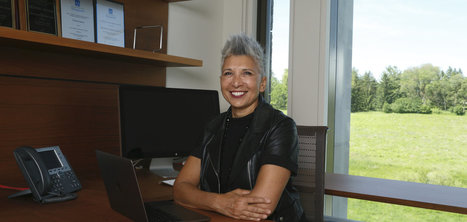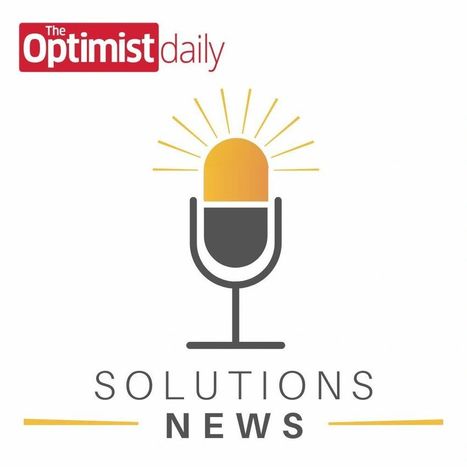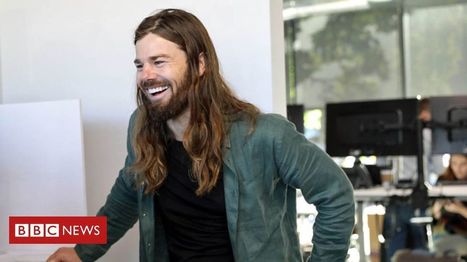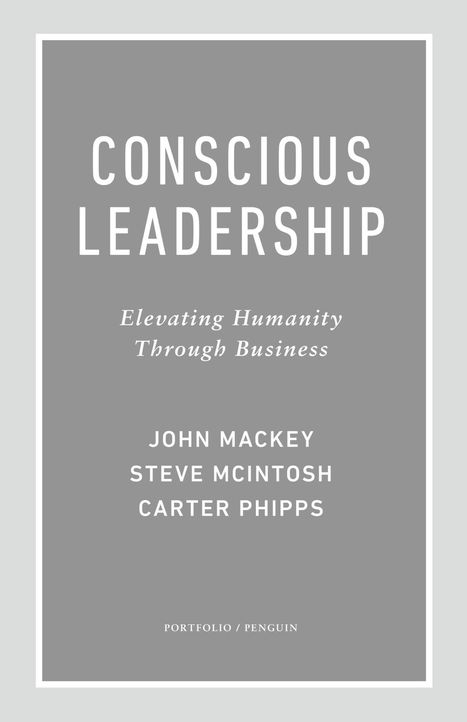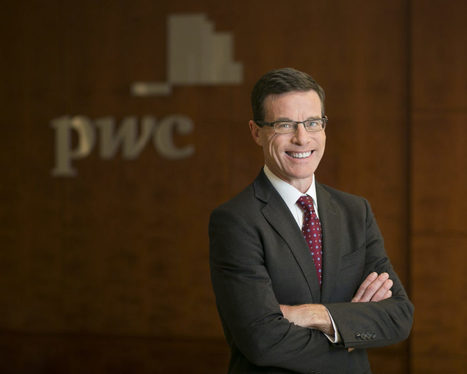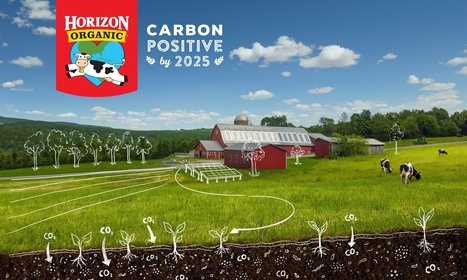Get Started for FREE
Sign up with Facebook Sign up with X
I don't have a Facebook or a X account

 Your new post is loading... Your new post is loading...
 Your new post is loading... Your new post is loading...
From
hbr
Capitalism is the greatest source of prosperity ever invented — but we can make it better.
David Cooperrider & Audrey Selian 's insight:
Is conscious capitalism an oxymoron?
The authors of the HBR classic--Raj Sisodia and John Mackey -- seek to get clearer on the concepts involved when they write: "We think of capitalism in simple and benign terms: it is simply the co-existence of free markets and free people, or economic and political freedom. Unique among all the species on this planet, we human beings are wired to create value and trade with each other. This is in our very nature. The evidence is overwhelming that whenever in history humans have enjoyed unencumbered freedom to do just that, we have prospered, our numbers have grown, and we have lived longer, happier and more peaceful lives. When our natural urges to interact and trade freely with others have been suppressed, we have regressed. See Matt Ridley’s terrific book The Rational Optimist for oodles of historical evidence of this. Consider what has happened in just the past 200 years or so, a time when capitalism really took root as an idea in many societies. After tens of millennia in which 85-90% of human beings lived on less than a dollar a day in today’s terms, worldwide per capita incomes have increased nearly fifteen-fold in constant dollars. Today, about 16% of the world’s population lives on less than a dollar a day. Adjusting for quality and affordability, it is estimated that the average American is 100 times better off today than 200 years ago. Average life expectancy has climbed from about 30 to over 67 years in that time span, and human population has risen from one billion in 1820 to over seven billion today. That is astounding progress, not just for a fortunate few but for most of humanity. We, state the authors, therefore hold these truths to be self-evident: "Business is good because it creates value, it is ethical because it is based on voluntary exchange, it is noble because it can elevate our existence and it is heroic because it lifts people out of poverty and creates prosperity." Free enterprise and the innovation and entrepreneurship it unleashes and nurtures, is one of the most powerful systems for social cooperation and human progress ever conceived. It is one of the most compelling ideas we humans have ever had. But we can and must aspire and aim higher to even more. The call of our time for betterment, especially regarding the calls for massive and urgently rapid climate action and inclusive human equality and dignified opportunity for all--is what the better business is now focusing on. Why, for example, is GM moving to renewable energy and eliminating the ICE--announcing their goal to produce only electric forms of mobility? Years ago the mantra was "What's good for GM is good for America." Today what we are seeing is a new reversal that might well apply to every future-fit corporation agile enough to respond to a society that's now changed its mind. This is the new truth that's now becoming self evident: "What's good for for the world, is good for GM."
"What the business community can do to leverage the shared values of humanity and entrepreneurship."
David Cooperrider & Audrey Selian 's insight:
Pioneer n. A person or group that originates a new line of thought or activity or a new method or technical development. (Merriam-Webster)
Pioneer n. An innovator. (American Heritage) Becoming the first blue-chip company to give investors a say on its climate strategy, Unilever’s Board, in a truly pioneering act, announced in December that it will put the company’s plans to cut greenhouse gas emissions to a shareholder vote, a move consistent with their decades-long leadership by example in corporate social responsibility. Shareholders will vote at the May 5 annual meeting on measures like cutting emissions in its operations and through its value chain to net zero by 2030, and cutting the environmental impact of its products by half. The $120 billion giant – makers of Ben & Jerry’s ice cream, Lipton tea, and Hellmann’s mayonnaise – also plans to cut emissions from product sourcing through point of sale to net zero by 2039, 11 years ahead of the Paris Accord deadline. This kind of courageous and business strengthening positioning has, as this article shares, been in the works for many years. When I interviewed Paul Polman a few months ago--Paul is currently Chairman of the International Chamber of Commerce and former CEO of Unilever--he spoke with urgency as well as with decades of delivering high purpose business outperformance. He spoke about the “shifting of the tectonic plates”—not a small step but a giant leap—from our industrial age paradigm of business to its successor. He asserted: "What we are witnessing is a shift that is all-embracing, rapid, irreversible, extending to the far corners of the planet and involving practically every aspect of business life. What we are witnessing is a world increasingly divided by companies that are known as part of the problem and those that are leading the solution revolution in this, the era of massive mobilization."
This Moving Company Now Helps Victims of Domestic Violence Leave Abusive Homes Nationwide At No Costacross their 131 franchise locations in the U.S. and Canada, offering the use of trucks and labor at no cost.
David Cooperrider & Audrey Selian 's insight:
I love this story of business as a force for good--it is about a moving company--and I especially love it because years ago, to pay for my college degree and graduate school days, I was a truck driver (every summer) for a moving company. What's the story about?
This moving company just announced last month a new commitment to provide free moves to victims of domestic violence and those currently living in abusive situations. Since the recent launch of the program, College HUNKS Hauling Junk & Moving has already completed over 100 free moves for those who are fleeing an unsafe situation in the U.S. and Canada. This new program is even more important as more cities are going into lockdown and victims can end up being trapped during the pandemic without relief. “I definitely think our Free Moves for Survivors of Domestic Violence program sheds light on a really important issue that is not often talked about,” College Hunks co-founder Nick Friedman told GNN. “As a purpose driven, socially-conscious organization we’re always looking for ways to positively impact our communities—in this case, particularly for those who feel powerless in unhealthy home situations.” ****************** Thank you Good New Network. Stories like this--showing unlikely companies raising hope and spreading healing--are out there and real, but their innovations are often too hidden by the overwhelmingly negative media of our day. Spreading good news stories is not an avoidance of reality but a powerful way to actually advance better realities!
David Cooperrider & Audrey Selian 's insight:
Message from the CEO of The Cleantech Group
On the day the US officially left the Paris accord, and with the U.S. election on a knife-edge (at the time of writing, at least), who knows where we are on global politics and the climate crisis. The planet will continue to keep the score, irrespective, and so we, the innovation community, bearers of the lantern of hope, must do our best to remain laser-focused on developing and accelerating solutions, and indeed highlighting and celebrating the entrepreneurs. In that spirit, we are delighted to give the focus of this month’s newsletter to our 50 to Watch program, featuring a new set of 50 early-stage companies from around the world, with climate-positive solutions. Many will be featured in the 18 November edition for Cleantech Interactive. Discover them live then, and through our report below. After APAC 25 in September, 50 to Watch now, it will soon be the turn of our Global Cleantech 100. Many of these companies will be featured within our virtual Cleantech Forums January bonanza. Save the dates for 12-14 January for the European version and 19-21 January for the San Francisco version. We should know the winner of the U.S. election by then, so please plan to be with us in January, and let’s get re-set for 2021+. That clock is still ticking, Covid and Covfefe aside. Message from Richard Youngman Can We Find A Climate Positive Path? As the climate crisis worsens, we are faced with an increasing number of global challenges including repeated wildfires and droughts, loss of biodiversity, polluted soils, plastic-filled oceans, rising inequality and more. To combat this crisis, a new generation of innovators is rising to task, tackling the world’s most pressing challenges with increasing resolve and urgency. These entrepreneurs are creating new technologies and business models that could solve the plastics crisis, regenerate soils, seed new forests, create climate-positive buildings and accelerate electrification. Now in its second year, our 50 to Watch program recognizes these early-stage innovators developing ground-breaking solutions to put us back on a climate-positive path. To create the 2020 list, we assembled a diverse panel of more than 30 investors and experts from across the globe to score, who nominated and reviewed more than 500 companies to get to the best 50. Jules Besnainou, Director Cleantech Group
In an open letter, the group of 14 CEOs calls on governments to accelerate such a transition by recognizing and supporting purpose-first business as an emerging fourth sector of the economy.
David Cooperrider & Audrey Selian 's insight:
In an open letter, the group of 14 CEOs calls on governments to accelerate such a transition by recognizing and supporting purpose-first business as an emerging fourth sector of the economy. A new coalition of global leaders including the CEOs of Danone, Interface, L’Oréal, Mastercard, Natura, Philips and 8 other companies — representing a combined annual revenue of over US$100 billion and a combined global workforce of over 500,000 — today endorsed a post-COVID roadmap to “build the economic system better.” Building on a wave of recent purpose-driven business declarations — including the Business Roundtable’s redefinition of the purpose of a corporation to one in which business promotes “an economy that serves all”; and LEAD on Climate 2020, which saw 300 business leaders calling on the US Congress to address recovery from the climate and COVID crises in tandem — the goal of the new roadmap is to create an inclusive and sustainable economy that benefits society, the planet and shareholders for generations to come. In an open letter, the group of fourteen CEOs — which have formed a for-benefit organization called Leaders on Purpose — called on governments to accelerate such a transition by recognizing and supporting purpose-first business as an emerging fourth sector of the economy. Governments around the world are debating economic and social policies designed to jumpstart the economy in the wake of the COVID-19 pandemic; the governments of Canada and the European Union have already put sustainability strategies front and center in their post-COVID recovery plans. Now, Leaders on Purpose’s “Build It Better” framework aims to guide public and private sector leaders toward innovation in public policy, as well as corporate and financial structures, to accelerate the growth of the purpose-first economy. The signatories have also committed to advance the purpose-first economy by leveraging their procurement, innovation, R&D and investment to accelerate the growth of this fourth sector. The letter provides a practical roadmap for proactively redesigning corporate structures and government policies in the development of a more supportive ecosystem for organizations that operate under a new business logic — and urges governments and other companies to join them. “Our world was a dangerous and troubled place even before COVID-19 took hold,” said Paul Polman, former CEO of Unilever, who is now working on transforming the structural impediments to sustainable business. “We have the chance to rebuild a fairer, greener society. But to do so, we need courageous business leaders who are willing to act, individually and as a collective. It’s why I applaud the signatories of this letter. No company alone can solve the problems we face. But together we can begin to challenge the orthodoxies which got us here. Together we can help the world change.” Denton (ICC), and Stefan De Loecker (Beiersdorf).
Norway ushers in an era of energy-positive architecture
David Cooperrider & Audrey Selian 's insight:
Svein Richard Brandtzæg, CEO of the aluminum company Hydro, responded first. From the conference stage, he extended an open invitation to join an unprecedented initiative for energy-positive construction: buildings that generate more energy than they use. A few months later, a “super team” was born. Hydro and the Zero Emission Resource Organisation (ZERO), the nonprofit behind the climate conference, joined the real-estate company Entra, the multinational construction group Skanska, and world-renowned architects Snøhetta to form an alliance—aptly named “Powerhouse.” Its ambitious mission: Create energy-positive buildings that, over a lifespan of 60 years, generate more energy than the total amount consumed for construction, daily operations, material production, and future demolition. Moreover, they proposed doing it in Norway—where long winters mean higher energy demands and reduced solar-cell efficiency. If it could be done there, alliance members surmised, it could be done anywhere. “We wanted to be number one,” Snøhetta senior architect Tine Hegli explains of the driving motivation behind the alliance. “The [first] to make an energy-positive building in the coldest part of Norway. We like to be pioneering. It’s not easy to get inspired by saving energy—not for architects, at least. But to be on a team, a super team, that will be the first . . . is really inspiring.”
From
www
The stakeholder perspective is often used in describing corporate social responsibility (CSR), the social license to operate, shared value, and corporate citizenship.
David Cooperrider & Audrey Selian 's insight:
A stakeholder perspective often forces companies to choose favourites. A systems perspective is better for everyone. So argues Professor Tima Bansal in this call to see the vast potentials of approaching stakeholder theory not in a reductionist way but a whole systems way--with all of its vast potentials for business as an agent of world benefit.
On this episode of Solutions News at the World Business Academy we welcome Mr. Yusuf George, the Managing Director of Capital Engagement for JUST Capital, and the author of a recent article in FORBES about Corporate Responsibility for healing the racial divide. We look for some Solutions to the ongoing inequalities that exist between different communities in our nation that’s supposed to be all about equality and justice for all. One area that must play a role in healing these divides that have plagued our nation since the beginning is the private sector, and particularly business – as one of, if not THE most powerful institutions in the USA
David Cooperrider & Audrey Selian 's insight:
The deaths of Black Americans – George Floyd, Breonna Taylor, and Ahmaud Arbery – coupled with the COVID-19 pandemic, have exposed serious and profound fault lines in the country. Factors like a lack of access to affordable healthcare, higher levels of unemployment, lower wages, the racial wealth gap, unequal access to quality education, have created barriers to the well-being of Black Americans. Well before coronavirus and this period of social unrest, Black Americans have historically faced considerable barriers in the labor market, including discrimination in their job searches, occupational segregation, lower wages, increased risks of being fired, and higher levels of unemployment than their White counterparts. In this episode Yusuf George of JUST Capital explores the call for stakeholder capitalism and is working to advance the number of corporations, as change champions, that are working to create a more just economy through stakeholder capitalism. If business does better when society does better, then it's imperative for all businesses to take this approach seriously. It is time to commit, innovate, and redress systemic racial inequities, which unfortunately grows more complex with each passing day.
Lead from the Future: How to Turn Visionary Thinking Into Breakthrough Growth
David Cooperrider & Audrey Selian 's insight:
In 2019, researchers identified the 20 global companies that had achieved the highest-impact transformations of the decade. A new, and elevated, sense of purpose was the #1 force--helping to build a better world.
Siemens, for example, had recently embraced an explicit mission to serve society. China’s Tencent had announced a quest to create “tech for social good”; while Denmark’s Ørsted transformed itself from a struggling oil and coal business to a cutting-edge wind energy company, increasing its net profits by some $3 billion per year. Ørsted’s long-term vision of itself as a green company not only inspires its people to perform, it helps its leaders keep its strategy on target. The Ørsted vision is a world that runs entirely on green energy. After selling off its oil and coal assets, Orsted became a model of reinvention. It was named the London School Economics 2017 Winner “Masters of Reinvention Award” Today Ørsted ranks #1 in Corporate Knights' 2020 index of the Global 100 most sustainable corporations in the world. Now here is the kicker. Researchers have tracked and traced it: 100 companies have been the source of more than 70% of the world’s greenhouse gas emissions since 1988, according to a powerful report. The Carbon Majors Report (pdf) “pinpoints how a relatively small set of fossil fuel producers may hold the key to systemic change on carbon emissions,” says Pedro Faria, technical director at environmental non-profit CDP. So now the Orsted story is multiplied and magnified in importance. In many ways its transformation, if understood and replicated--or at least used to inspire others innovations in that group of 100--could become worldchanging, with positive implications for business and the entire planet for many generations. Imagine further the Orsted transformation. Here an oil and coal company becomes a force for building a world that runs entirely of green energy. To me it would be like one of the world's largest tobacco companies turning into a nutritional excellence leader. Sounds impossible doesn't it? Well not only did Orsted pull of this kind of grand transformation but in three years-- from 2017 to 2020-- its stocks, in Danish Kroners, rose from 200 to 654. This is more than shared value strategy in action. It involves becoming a champion for change--where institutions become what we in appreciative inquiry call "positive institutions" that is, institutions that elevate our highest human strengths, multiply our highest human strengths, and then refract those strengths "outward" in the service of building a better world .
A tech boss introduced a $70,000 minimum salary for all his staff - by cutting his own wages. Five years, on he has no regrets.
David Cooperrider & Audrey Selian 's insight:
Dan Price, the CEO of Gravity (a high tech payment company in Seattle), raised all of his employees salaries to at least $70K. A full third of those working at the company would have their salaries doubled immediately. Since then, Gravity has transformed. The headcount has doubled and the value of payments that the company processes has gone from $3.8bn a year to $10.2bn. But there are other metrics that the CEO Price is more proud of. He is proud of the growth and commitment to the concept of family. He said: "Before the $70,000 minimum wage, we were having between zero and two babies born per year amongst the team," he says. "And since the announcement - and it's been only about four-and-a-half years - we've had more than 40 babies."
Dan is among a growing number of business leaders very concerned about the hollowing of our middle class and he has studied how well-being seems to go up as people rise in income to something around 70 to 75 k, but then, thereafter, happiness does not go up further based on income. What an interesting, live case or experiment in creating more equality in economic terms.
Despite increased awareness among investors, physical climate risk from extreme weather remains surprisingly unaccounted for in financial markets. Without better knowledge of this risk, the average energy investor can only hope that the next extreme event will not trigger a sudden correction to the market values of energy firms.
David Cooperrider & Audrey Selian 's insight:
Financial markets are failing to account for the risks that increasingly frequent and worsening floods, droughts, and other extreme weather events pose to the economy, according to an article published in the journal Nature Energy this week.”If the market doesn’t do a better job of accounting for climate, we could have a recession—the likes of which we’ve never seen before,” said study author Paul Griffin, an accounting professor at the UC Davis Graduate School of Management.Griffin said in the article that his years of research concluded that “unpriced risk” was the “main cause” of the 2007-08 Great Recession and companies are once again failing to assess the damage extreme weather events can wreak on their business. Professor warns: A recession ‘the likes of which we’ve never seen before’ could be on its way
Despite countless studies, there has never been conclusive evidence that socially responsible screens deliver alpha. A better model exists, argue Harvard Business School luminaries Michael Porter, George Serafeim, and Mark Kramer.
David Cooperrider & Audrey Selian 's insight:
In Chris Laszlo's book on "Sustainable Value" he asks us to envision two dimensions to sustainable value creation, a bit similar to Michael Porter and Mark Kramer's call for "shared value"--see article link. Sustainable value is an outcome of two kinds of value creation or valued destruction. It's a combination of stakeholder value (value creation as positive in the eyes of stakeholders) AND shareholder value or profitable business for owners and investors. Shared-value companies pay attention to both and will be doing things differently than their competitors in ways that connect social impact and ecological benefit with shareholder value. A Shared-value approach can affect strategy at three mutually reinforcing levels: (1) creating new products that address emerging social needs or open currently unserved customer segments--that is, strategically turning social and global issues into business opportunities that align with and leverage a company's dynamic strengths; (2) enhancing productivity in the value chain, whether by finding new efficiencies or increasing the productivity of employees and suppliers; and (3) investing to improve the business environment or industry cluster in the regions where the company operates. Shared-value strategies such as these go far beyond traditional, siloed ESG thinking by tying social impact directly to competitive advantage and economic performance. This is by far the most powerful way for companies to help address the world’s grave social and global challenges. Why? Well imagine a "do good" and well intentioned company taking on social and global challenges for which it has no skills to address, or is a bit value destroyer for the company. Taken to its logical extreme, it does "good" but goes out of business so it no longer can do good things. This is actually a lose-lose proposition in the long run. So too is a strategy that creates great shareholder value (and often over counting benefits) while shifting great short and long term costs onto society, our health, our future generations (where we undercount costs and harms), By externalizing costs--for example illegally or even legally pouring toxins into our water supplies--costs that someday need to be accounted for, companies risk many things. Think of the $40 billion or more inn fines and litigation that Volkswagen had to swallow. It was an existential moment and for most companies would have been a death sentence. So again, what might at first look like a win-lose proposition, it today's radically transparent world it is often lose-lose once again: harm for the world an harm for the business. This kind of cost shifting (to society) and benefit borrowing (for the company) is becoming more and more what someone once called "a frenzied game of musical chairs." Where when the music stops, there is a bill to pay. A shareholder only paradigm often drives companies to systematically undercount the costs of external harm and overcount (by borrowing from their hidden society harm) the benefits to shareholders. The future of business is shared value--with truer market signals and less market failure (like undercounting long term costs, because long term or not, costs are costs, they are debts, and debts need to be repaid.)
David Cooperrider & Audrey Selian 's insight:
Lise Kingo, former senior executive as Novo Nordisk and now the CEO of the UN Global Compact is pictured with Julie Sweet, the global head of Accenture Strategy, and others.
Lise Kingo writes:"The Decade of Action marks a shift. The planetary window for "business as usual" is rapidly closing, leaving us with a climate emergency of existential proportions. Coupled with environmental degradation, loss of biodiversity and growing social and economic disparities, framework conditions for governments, businesses and citizens alike are becoming increasingly unsafe and unpredictable. Therefore, it is no surprise that media commentaries and activists questioned all of us delegates at the forum in Davos: Are you showing true concern, ready to go back and take the needed action? Or is it just talk? For sure, to date, our collective actions have not been transformational or comprehensive enough to match the scale of the sustainability challenges we face. The time to act is now. It’s time to increase ambition The U.N. Global Compact came armed with one ask for business leaders: To kick-start the Decade of Action by increasing ambition and embed the 10 Principles and the SDGs into business strategy. Through a groundbreaking partnership with SAP, a world-leading digital infrastructure provider, and Accenture Strategy, a world-leading strategy consultancy, U.N. Global Compact launched SDG Ambition together with U.N. Secretary-General António Guterres. "We expect to work with at least 1,000 companies in 40 markets over the next three years to accelerate the pace of change." This brand-new and transformational global initiative wants nothing less than to change business models so they become future-fit for Agenda 2030. A cornerstone is a practical SDG Implementation Framework. It guides businesses in how to anchor SDG ambition as part of their purpose, governance, corporate strategy and goals; how to deepen integration across operations — into products and services, people management and corporate finance. And finally, alongside the integration of ambition, how to authentically enhance stakeholder engagement through reporting and corporate communications, sales and marketing, partnerships and stakeholder relations. This new initiative will be rolled out via the U.N. Global Compact Local Networks at the country level, to challenge and support companies across the world in raising ambition and deepening implementation. We expect to work with at least 1,000 companies in 40 markets over the next three years to accelerate the pace of change. .... Here we will reimagine, reset and redefine ambition, leadership and action to deliver the world we want. Towards 2030, we all need to become activists." |
The climate transition presents a historic investment opportunity, one that will enable the continuation of a massive acceleration of capital towards companies better prepared to address climate risk, wrote BlackRock chairman and CEO Larry Fink in his annual letter to CEOs.
David Cooperrider & Audrey Selian 's insight:
When Blackrock CEO speaks it is not just a friendly suggestion. Blackrock manages nearly $9 trillion in assets and Blackrock CEO Larry Fink anticipates a sea change in worldwide climate action and "a fundamental transformation of the finance industry"....The world of net zero calls for a transformation of not only finance but every industry and every business. This article explains why--why this is not a trend anymore, but a trajectory that business leaders ignore at a large risk.
More positively: the climate transition presents a historic investment opportunity, one that will enable the continuation of a massive acceleration of capital towards companies better prepared to address climate risk, wrote BlackRock chairman and CEO Larry Fink in his annual letter to CEOs. Every management team needs to consider how this transition will affect their company’s stock, he wrote, warning that companies that are not actively preparing themselves for the transition to a “net zero” economy will see their businesses and valuations suffer. The recent transition towards more sustainable investments — from January through November 2020, investors in mutual funds and ETFs invested $288 billion globally in sustainable assets, a 96% increase over the whole of 2019 — has been driven in part by the growing availability and affordability of sustainable investment options. “Not long ago, building a climate-aware portfolio was a painstaking process, available only to the largest investors. But the creation of sustainable index investments has enabled a massive acceleration of capital towards companies better prepared to address climate risk.” Alongside the shift in investor behavior has come a shift in policy response to climate change. In 2020, the EU, China, Japan, and South Korea all made historic commitments to achieve net zero emissions. With the US commitment last week to rejoin the Paris Agreement, 127 governments – responsible for more than 60% of global emissions – are considering or already implementing commitments to net zero. This will have dramatic implications for the global economy, with no company being immune from a profound impact of the transition to a net zero economy, Fisk wrote. As the transition accelerates, companies with a well-articulated long-term strategy, and a clear plan to address the transition to net zero, will distinguish themselves with their stakeholders. Companies that are not quickly preparing themselves will see their businesses and valuations suffer, as stakeholders lose confidence that those companies can adapt their business models to the dramatic changes that are coming. It’s important to recognize that net zero demands a transformation of the entire economy, Fisk wrote, requiring both technological innovation and planning over decades. “And it can only be accomplished with leadership, coordination, and support at every level of government, working in partnership with the private sector to maximize prosperity,” he said. Categories
The role of corporations in society shifted permanently in 2020.
David Cooperrider & Audrey Selian 's insight:
The stakeholder–shareholder debate is over. The role of corporations in society shifted permanently in 2020. The private sector is inherently a public good and operates in what we call "the envelope of enterprise". It's a life-giving envelope that includes every stakeholder that can impact the life and success of a company--local and global communities; nature and natural capital; healthy or unhealthy societies; consumer citizens; earth systems; our biosphere etc.
Conscious Leadership: Elevating Humanity Through Business - Kindle edition by Mackey, John, Mcintosh, Steve, Phipps, Carter. Download it once and read it on your Kindle device, PC, phones or tablets. Use features like bookmarks, note taking and highlighting while reading Conscious Leadership: Elevating Humanity Through Business.
David Cooperrider & Audrey Selian 's insight:
Investors like Alexander Green love this book about business. Green writes:
"There's an unfortunate narrative making the rounds today that can be summed up in two words: Business sucks. Academia, the mainstream media, and Hollywood regularly promote the idea that business is all about greed, selfishness, and exploitation. We hear it every day. "Those sharks will eat you alive." "You have to look out for No. 1." "It's every man for himself." "Nice guys finish last." Remarks like these lead some folks to believe that business success is all about ruthless, backstabbing, cutthroat competition not only between organizations but within them. Sadly, at some organizations this is true. But not at the most successful ones. Great businesses understand that to maximize profits you have to look out for the interests of all stakeholders. This includes investors, managers, workers, suppliers, customers, and communities. My friend John Mackey, founder and CEO of Whole Foods, made this clear in his book Conscious Capitalismseven years ago. Two fascinating threads ran through that book. The first was the almost unbelievable story of the founding and growth of Whole Foods Market from a single small shop in Austin to the world's largest chain of natural food stores and membership in Fortune magazine's Top 50 Most Admired Companies. The second was John's mission to help improve the world and rebrand the free enterprise system to reveal its heroic nature. Heroic? John points out that business is good because it creates value. It is ethical because it is based on voluntary exchange. It is noble because it elevates our existence. And it is heroic because it lifts people out of poverty and creates prosperity. Visit any Whole Foods outlet and you'll find something you rarely see outside of an Apple store: rabid customer loyalty. Whole Foods obsessively seeks out the finest natural and organic foods available and maintains the strictest quality standards in the industry. And customers know it. Moreover, employees there regularly tell me they are working the best jobs they've ever had. Whole Foods stands apart from its competitors, a highly innovative firm in an industry that rarely innovates at all. (And that innovation has only accelerated since its acquisition by Amazon three years ago.) However, Whole Foods is about a lot more than selling groceries and making money. Its Whole Planet Foundation alleviates global poverty for people living in communities in the U.S. and around the world. Whole Kids Foundation supports schools and inspires families to improve children's nutrition and wellness. Whole Cities Foundation expands healthy food access and nutrition education by partnering with community-led organizations to build thriving local food systems. And Whole Trade promotes ethical working conditions and a higher-quality natural environment. Whole Foods is extraordinary in so many respects. How do you build a business like this - or find one to invest in? It isn't intuitive. That much is obvious or we'd see hundreds of other businesses following this model. And we may, eventually. Because John - along with Steve McIntosh and Carter Phipps of the nonprofit Institute for Cultural Evolution - has recently published a new book: Conscious Leadership: Elevating Humanity Through Business. It should be required reading for everyone who heads an organization - or even a department in an organization. You can tell me you've already read loads of business books - and I hear you. They're all about setting priorities, streamlining operations, fostering communication, listening to customers, and so on. This book doesn't just go far beyond that. It flies 30,000 feet above it. Conscious leaders put purpose first. They are driven not just by the desire for profit - which every business needs to survive and grow - but also by a vision of how they can make a positive contribution to the world. Conscious leaders act with integrity, holding themselves and the organization to the highest standards in order to earn the trust of those they lead as well as those they serve. It means committing to learning and growth, not only professionally but personally. It means showing genuine appreciation to the people who make success possible. (Not just with compensation and promotions but in a multitude of tiny, everyday ways.) It means finding win-win solutions to every challenge, whenever possible. But the first and foremost job of every conscious leader is connecting people to purpose. Businesses that do this - public or private - have satisfied employees, dependable suppliers, raving fans for customers, better reputations, fewer regulatory and legal hassles, greater market share, and - not least of all - bigger profits. If you're a business person or investor, you need this book. In my next column, I'll explain exactly why... and point out several publicly traded companies that exemplify conscious leadership."
Every journey begins for a reason. Fifteen years ago, Walmart started on our journey to become a more sustainable company. We set aspirational goals to achieve 100% renewable energy, zero waste and a more sustainable supply chain for people and the planet.
David Cooperrider & Audrey Selian 's insight:
“USING OUR STRENGTHS TO HELP PEOPLE LIVE BETTER AND PRESERVE THE PLANET”
The World’s largest retailer just announced this month its plan and targets to reach zero emissions by 2040 and aims to protect, manage or restore at least 50 million acres of land and one million square miles of ocean by 2030. The CEO Doug McMillon states: "We want to play an important role in transforming the world’s supply chains to be regenerative. We face a growing crisis of climate change and nature loss, and we all need to take action with urgency. For 15 years, we have been partnering to do the work and continually raising our sustainability ambitions across climate action, nature, waste and people. The commitments we’re making today not only aim to decarbonize Walmart’s global operations, they also put us on the path to becoming a regenerative company – one that works to restore, renew and replenish in addition to preserving our planet, and encourages others to do the same." How did this happen? Since 2005, Walmart has been collaborating with others to drive positive change through whole system in the room and Appreciative Inquiry strengths based approaches to change across global supply chains. The book FORCE OF NATURE TELLS THE BACKSTORY OF WALMART'S EARLY JOURNEY What happens when a Jib Ellison, Dave Sherman, and Chris Laszlo (strategy thinkers) and change champions such as David Cooperrider (author of Appreciative Inquiry and the strengths based whole-system-in-the room AI Summit methods) team up with the CEO and change leaders of one of the largest—and, and at the time, one of the least Earth-friendly--corporations in the world? "Nothing less than a green business revolution" says author Edward Humes in his book, FORCE OF NATURE: The Unlikely Story of Wal-Mart's Green Revolution. The journey transformed into a massive sustainability makeover, which now has snowballed beyond the retailer to influence whole industries, from apparel and magazines, to dairy and to banking, electronics, food supplies, textiles, Now their fresh take on sustainability is empowering a virtual second industrial revolution based on a simple truth: that the clean, green, efficient, less-wasteful, less polluting way of doing business can also be the most profitable way of doing business, while helping customers live better and become part of a positive revolution.
B Lab founder discusses B Corps and the interdependence of business.
David Cooperrider & Audrey Selian 's insight:
The McKinsey Quarterly: Do you think there is a limit to what the free market can solve? Or, properly channeled, can it solve more than we expect?
Andrew Kassoy: Yes to both. The amazing thing, and for me the inspiring thing, about the first 16 years of my career was seeing the capacity of the private sector to create things, and to attract capital and talent in order to scale them. It’s amazing what capitalism can produce that other systems have not been able to. It’s pulled billions of people out of poverty and created innovations that have improved many people’s lives. I think we, at our peril, underestimate how much business can do for social good if the system is structured in the right way. I would also say we shouldn’t be myopic and believe that free enterprise solves all problems, because there are plenty of challenges that the market simply can’t solve. In the United States, we have racial- and social-justice issues that the market’s not going to solve by itself. There are elements of the environmental crisis we face that are not going to be solved solely by business behaving differently. They’re going to require public-policy solutions. The government and the not-for-profit sector are absolutely necessary. They’re just insufficient without us changing the system of business and the capital markets as well. The reason we founded B Lab was not so that we could drive every company to be a B Corp, or to build an empire of B Corps. It was to create a model and a credible community of leaders who are using that model so that everyone else can follow and we can change the economic system.
From
hbr
The Business Roundtable’s letter could mark a turning point.
David Cooperrider & Audrey Selian 's insight:
This debate — whether purpose and profits work together or are fundamentally at odds with each other — can be informed by empirical research. And the findings of this Harvard Business Review report and ongoing research initiative on corporate purpose support the views of Larry Fink and now of the Business Roundtable: Purpose and profit tend to go together. Using more than 1.5 million employee-level observations across thousands of companies, we quantified purpose as the aggregate sense of meaning and impact felt by employees of a corporation. If the company has a strong corporate purpose, our research shows, its employees will feel greater meaning and impact in their jobs. This view reflects the opening sentence in the BR report: “Americans deserve an economy that allows each person to succeed through hard work and creativity and to lead a life of meaning and dignity” (emphasis ours). In our data we find that companies with high levels of purpose outperform the market by 5%–7% per year, on par with companies with best-in-class governance and innovative capabilities. They also grow faster and have higher profitability. However, the link between purpose and profitability is present only if senior management has been successful in diffusing that sense of purpose further down in the organization, especially in middle management, and in providing strategic clarity throughout the organization on how to achieve that purpose.
The COVID-19 crisis has intensified existing trends, widening the gap between those at the top and bottom of the power curve of economic profit. Will your strategy keep you ahead of the accelerated pace of change?
David Cooperrider & Audrey Selian 's insight:
Companies with resilient, future-ready business models--such as ESG leaders, technology leaders, and more fully human flourishing enterprises--are increasingly positioned to ride these trends have pulled further away from their industry peers, while those with legacy business models have, for the most part, fallen further behind. This McKinsey report says it's time to identify the big moves--not after the pandemic, but now. Here is why... and click here for how: https://journals.sagepub.com/doi/full/10.1177/0021886320936265
Lots of resources on understanding and developing organizations as positive institutions. Included are bibliographies, and videos for example Raj Sisodia on fully human organizations and David Cooperrider's Tedx talk about his project at the United Nations where Appreciative Inquiry was used to help build the growth strategy for the UN Global Compact, which is now the largest corporate sustainability network in the world.
David Cooperrider & Audrey Selian 's insight:
What is Positive Organizational Psychology? Appreciative Inquiry? Positive Organization Scholarship? Positive Organization Development? Here in this article are lots of solid resources and references for understanding and developing organizations as positive institutions. Included are bibliographies, and videos for example Raj Sisodia on fully human organizations and David Cooperrider's Tedx talk about the Appreciative Inquiry work at the United Nations where the AI Summit method was used to help build the growth strategy for the UN Global Compact, which is now the largest corporate sustainability network in the world.
PwC's U.S. head Tim Ryan said that leaders need to be absorbing stress, not creating it.
David Cooperrider & Audrey Selian 's insight:
In the midst of the coronavirus pandemic, what leadership lessons are there for and future managers students in our EMBA and MBA programs? At $19 trillion, the U.S. private sector is four times the size of government and 40 times the size of private philanthropy. What does this imply about partnership, and multi-stakeholder opportunities for win-win?
PWC Chairman speaks to the question of leadership--how they need to be absorbing stress, and not creating it. Jens Molbak has noticed how the pace of progress on major societal issues can be frustratingly slow, often because of the siloed nature of companies, governments, and nonprofits. In addition, there is a multi-trillion dollar funding gap that neither taxes nor philanthropy can fill on their own. How might the coronavirus moment instil leadership and society lessons for the future? Tremendous assets exist un-leveraged in all three sectors that can be unlocked for new value when seen from a new perspective-see https://www.newimpact.care/about Harnessing the self-interests of all three sectors is essential to drive sustainable solutions to scale. Tri-sector innovators exist across all organizations and sectors, who can create new, or augment existing, business models. Private sector value creation and good for society can be synergistic. There is significant investment capital available to companies that use tri-sector business models to drive higher returns and greater social impact. It is through the combined, collective efforts of people, companies, non-profits, and governments that we can create a better world.
Horizon Organic, the largest USDA certified organic dairy brand in the world, today announced a commitment to become carbon positive by 2025.
David Cooperrider & Audrey Selian 's insight:
Many companies are announcing great reductions to become carbon neutral in a decade or two but few have the accelerator to the pedal like Horizons Organic. Horizon Organic is the largest USDA certified organic dairy brand in the world and just today it announced a commitment to become not just carbon neutral but carbon positive by 2025. Horizon Organic’s goal is to be the first national dairy brand to become carbon positive not just itself but across its full supply chain. The company plans to achieve carbon neutrality, and then go further to remove, reduce, and offset additional emissions from entering the atmosphere, becoming carbon positive. The Horizon Organic path to carbon positive will start with its new "Growing Years" whole milk half gallons, which will be the brand’s first certified carbon neutral product by the end of 2021. That's next year! Horizon Organic will continue to advance product certifications in direct partnership with family farms through 2025. The brand has already begun the certification process with The Carbon Trust2 and is working alongside many other friends on the journey, including The Organic Trade Association and Green America’s Center for Sustainability Solutions.
The Body Shop plans to expand the practice to all of its retail stores this summer, where it employs around 800 people, and as many as 1,000 during the holidays. It’s not a pilot, but a permanent shift in how it handles hiring. “I think for us, it was, if you believe in it, just go ahead and do it,”
David Cooperrider & Audrey Selian 's insight:
The Body Shop will hire the first person who applies for any retail job: This open hiring movement was started by Greyston Bakery, whose slogan “We don’t hire people to bake brownies, we bake brownies to hire people,” adheres to our tenet, “Be a purpose with a company, not a company with a purpose.”
The Body Shop studied what was happening at Greystone Bakery and decided open hiring represented a management move that fit their values and that sweet spot of how doing good enriches doing well .”The results were striking: Monthly turnover in the distribution center dropped by 60%. In 2018, the Body Shop’s distribution center saw turnover rates of 38% in November and 43% in December. In 2019, after they began using open hiring, that decreased to 14% in November and 16% in December. The company only had to work with one temp agency instead of three. Supervisors told Blieden that seasonal staff were approaching them to share their stories. “They said things like, ‘I’ve been struggling to find a job. This is one of the only places that would hire me, and I’m not going to mess this up,'” she says. “When you give people access to something that they’re struggling to find, they’re very committed to working hard and keeping it.”
ESG programs and the ESG premium--its large, its growing, and in five years is going to represent a game change in our theory of the business | McKinsey
David Cooperrider & Audrey Selian 's insight:
McKinsey has just issued its report of how companies advancing social, ecological and better governance (ESG) issues enrich the value of a company. In its McKinsey Global Survey executives are given a hypothetical opportunity to acquire a new business. The core finding was this: respondents across the spectrum say they would be willing to pay about a 10 percent premium for a company with an overall positive record on ESG issues over a company with an overall negative record. That median value is consistent between CEOs and other C-level executives, as well as among respondents with various office locations and company focuses, sizes, and ownership structures. Some pockets of respondents anticipate "extraordinary value from positive records on ESG." One-quarter of respondents say they would be willing to pay a premium of 20 to 50 percent for a company leading what we call the solution revolution, and 7 percent say they would pay a premium of more than 50 percent. These are not the old numbers of a slight business value improvement from old and outworn notions of corporate social responsibility. These are signals of where 21st century advantage is going to be--in fact, most executives see these numbers as low, compared to where business will be (and the world it will be in) five years from now. What we are seeing are trends becoming trajectories.
|


